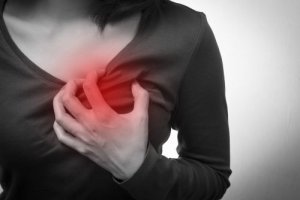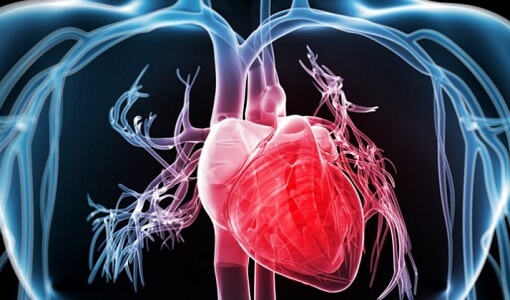5 Cardiac Arrest Symptoms that Only Appear in Women


Reviewed and approved by the doctor Nelton Abdon Ramos Rojas
Pay attention, because they might end up being very useful. These symptoms can help you, or someone close to you, react in time in the case of cardiac arrest.
We have to keep in mind that cardiac arrests are one of the biggest causes of premature death in the world.
There are certain signals that our body sends us that can’t be ignored and can end up saving our lives.
It’s important to act in time because people have a higher chance of surviving if they receive defibrillation (an electric shocked used to restore a normal heart beat).
In the event that defibrillation isn’t a option at that moment, the person suffering cardiac arrest should receive cardiopulmonary resuscitation.
In any case, it’s fundamental to identify the symptoms in time.
Cardiac arrest

Although the heart has an internal system that is responsible for controlling the heartbeat, there are several conditions that can derive from irregular heartbeats, which is known as arrhythmia.
Arrhythmia causes the heart to beat too slow, fast or it even stop beating it from entirely.
In these cases, there is a sudden cardiac arrest, but that’s not to be confused with a heart attack.
Want to know more? Read: 5 Powerful Ways that Aloe Vera Takes Care of Your Heart
There are various possible causes that can lead to cardiac arrest. Among them are:
- Coronary diseases
- Physical stress
- Genetic conditions
Signs of cardiac arrest only found in women
1. Back, neck, jaw and arm pain
If your back, neck, jaw and arms hurt, it’s vital to be take caution because it’s very easy to confuse these symptoms. Though they are easily confused, they can be a clear signal of what is to follow.
Whether the pain developed over time, dully or sharply- and especially if it developed suddenly- if you are experiencing these kinds of pain see your doctor immediately.
2. Stomach pains accompanied by nausea

If you have stomach pain, as well as nausea, be careful. It could very well be another clear indication of cardiac arrest.
You might confuse it with food poisoning or the flu and its side-effects. If you feel a strong pressure in your stomach, make an appointment with your doctor.
3. Breathing problems and dizziness
If you have repetitive breathing problems, you should check to see if you are also experiencing other symptoms.
4. Cold sweats

Cold sweats can also be another symptom that women experience in cardiac arrest and it shouldn’t be taken lightly.
Be careful and don’t automatically think that it could be a cause of daily stress or current worries. If cold sweat is something you usually didn’t suffer from before, see the doctor as soon as possible.
5. Tiring out quickly and frequently
Do you feel tired in a matter of minutes and often? If so, you should keep reading.
Even after resting, if you feel so tired that you can’t seem to do even the most basic chores, such as getting up or walking, it’s a troubling symptom.
Recognize it as the real potential danger that it is.
Visit this article: Chronic Fatigue Syndrome
Treatment
If you’ve suffered from cardiac arrest, it goes without saying that, a posteriori, you should take more health precautions to avoid letting it happen again.
- You have to let go of harmful habits, such as tobacco, alcohol and a sedentary lifestyle (that leads to obesity).
- Of course, you must exercise in order to steadily control blood pressure, cholesterol and diabetes.
Don’t forget that there are also preferred medications that benefit cardiovascular health.
While these are recommendations for people who suffer heart-related symptoms, only your personal doctor should be the one who outlines the treatment best suited for your case.
Make a healthy lifestyle, exercise and banishing stress the three big pillars of your life.
All cited sources were thoroughly reviewed by our team to ensure their quality, reliability, currency, and validity. The bibliography of this article was considered reliable and of academic or scientific accuracy.
- Pedreira, M. (2016). Infarto agudo de miocardio en la mujer, ¿es diferente que en los hombres? In I. Fernández, J. J. Gómez de Diego, M. López, D. Marzal, N. Murga, & R. Vidal (Eds.), Cardiología hoy 2016. Resumen anual de los avances en investigación y cambios en la práctica clínica (p. 207). Sociedad Española de Cardiología. https://doi.org/10.1111/j.1752-1734.2009.01350.x.
- Cabadés, A., López-Bescós, L., Arós, F., Loma-Osorio, Á., Bosch, X., Pabón, P., & Marrugat, J. (2004). Variabilidad en el manejo y pronóstico a corto y medio plazo del infarto de miocardio en España: el estudio PRIAMHO. Revista Española de Cardiología, 52(10), 767–775. https://doi.org/10.1016/S0300-8932(99)75004-9
- Lauer, T., & Kelm, M. (2011). Tratamiento inicial prehospitalario del infarto agudo de miocardio. Deutsche Medizinische Wochenschrift. https://doi.org/10.1093/eurheartj/ehr236
This text is provided for informational purposes only and does not replace consultation with a professional. If in doubt, consult your specialist.








